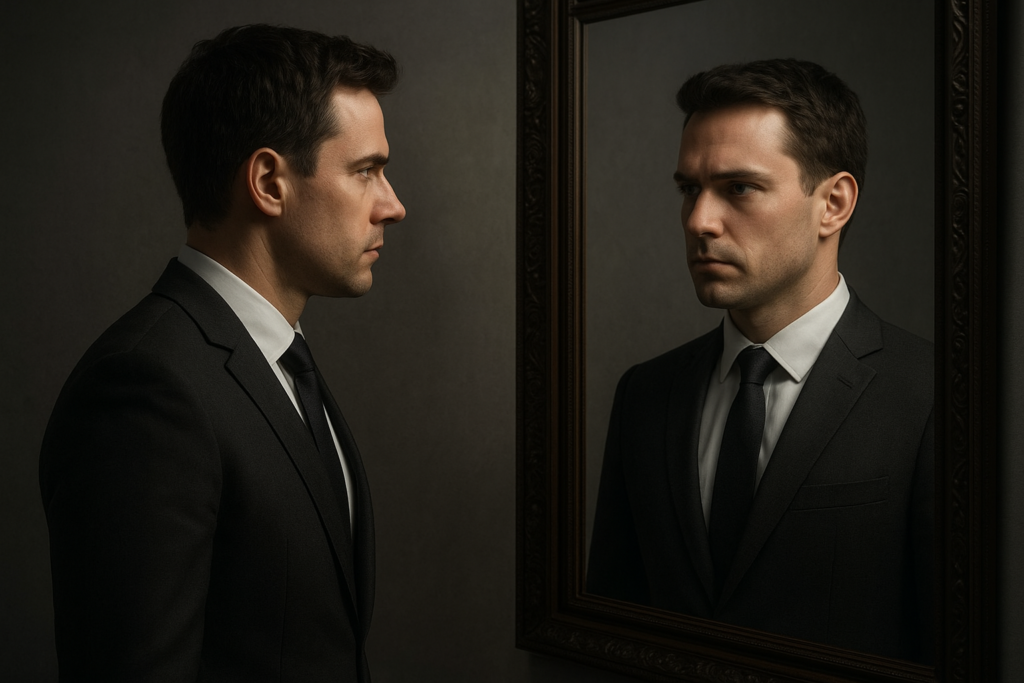Introduction: The Power of Reflection in Human Interaction

In every social or professional encounter, the person who controls emotion controls the outcome. People often respond not to logic, but to the way they feel in your presence. The most powerful individuals understand this—and use the subtle art of mirroring to guide, manipulate, and disarm others without saying a word.
The Mirror Effect is a psychological weapon disguised as empathy. When you reflect someone’s behavior, tone, or energy back at them, they become trapped in their own emotional echo. They see themselves—and that can be either deeply comforting or profoundly unsettling, depending on your intent.
Used wisely, this technique can dissolve hostility, build alliances, and turn opponents into allies. Used strategically, it can also expose hidden motives and make aggressors lose control.
Why Mirroring Works: The Psychology of Human Reflection
Human beings are wired for imitation. Psychologists call this the chameleon effect—we subconsciously mirror people we like or want approval from. The brain reads similarity as safety, which is why we bond faster with those who reflect us.
But mirroring goes deeper than body language. It operates on three psychological levels:
- Emotional Reflection – Responding to others with the same tone or emotional energy they display.
- Behavioral Reflection – Matching actions, phrasing, or rhythm to build subconscious connection.
- Strategic Reflection – Using imitation as a tool to expose insecurities, reveal hypocrisy, or regain control.
Those who master this can calm conflict, gain influence, or even make powerful people unravel under their own emotional weight.
When Reflection Becomes Power
The Mirror Effect isn’t about flattery—it’s about control. By reflecting back the behavior or energy someone gives you, you remove your own emotional reaction from the equation. You don’t resist; you reflect.
When people attack you, expecting anger or submission, mirroring their behavior frustrates them. You become a psychological mirror—showing them their aggression, ego, or fear. Instead of getting the reaction they want, they’re faced with themselves. That’s when they lose balance—and you regain power.
The Mirror Diplomacy of Queen Elizabeth I

Queen Elizabeth I of England was a master of psychological strategy. Surrounded by ambitious nobles, foreign suitors, and rival nations, she maintained dominance through calm reflection.
When courtiers tried to manipulate her emotions or pressure her into alliances, she never reacted impulsively. Instead, she mirrored their tone—calm when they were calm, indifferent when they were desperate, warm when it served her interests.
Foreign ambassadors often left her court convinced she agreed with them—only to later realize she had promised nothing at all. Her reflective diplomacy made others project their hopes and fears onto her, while she quietly gathered information and controlled the narrative.
Elizabeth’s mirror-like composure wasn’t weakness—it was power disguised as stillness.
Modern Applications: Using the Mirror Effect Today
You don’t need to be a monarch to use this strategy. In today’s fast-paced, emotionally charged world, mirroring can help you thrive in leadership, business, and personal relationships.
1. In Business Negotiations
When a client or competitor becomes aggressive, remain calm and repeat their concerns in their own words.
Example: “So you’re saying the timeline feels too short for quality delivery?”
By mirroring their frustration neutrally, you disarm their emotion and bring them back to logic.
2. In Leadership
Leaders who mirror calmness in crisis inspire confidence. When others panic, your composed reflection becomes the emotional anchor that steadies the group.
3. In Personal Relationships
Mirroring empathy deepens trust. When you reflect understanding rather than judgment, people open up more—making you both likable and influential.
4. In Conflict Resolution
By mirroring anger without adding fuel, you neutralize tension. When someone shouts and you respond evenly—“I hear that you’re upset”—they lose momentum. Their emotional weapon has no target.
The Dark Side of Mirroring
Like any tool of power, mirroring can backfire when used manipulatively. Overuse can come across as mockery or deception. People sense insincerity fast.
To use this power ethically:
- Mirror to understand, not to mock.
- Reflect to build calm, not chaos.
- Use silence as your strongest mirror when words fail.
The goal is not to manipulate others, but to master your emotional presence—so no one else can manipulate you.
Signs You’re Losing Power in an Interaction
If you find yourself:
- Reacting emotionally instead of observing,
- Explaining yourself too much,
- Feeling provoked or defensive,
- Getting pulled into other people’s moods,
—you’ve stopped mirroring and started absorbing. The key is to return to neutrality. Be the mirror, not the reflection.
How to Build the Mirror Mindset
- Detach Emotionally. Observe the situation like an outsider before responding.
- Reflect Calm Energy. Your steadiness forces others to match it.
- Repeat and Reframe. Use their own words to show understanding and control the narrative.
- Stay Ambiguous. Reveal nothing until you’ve read the full emotional field.
- Let Silence Work. Pauses create discomfort in others and power for you.
Modern Example: The CEO Who Wins Through Reflection
In corporate negotiations, some of the most successful executives never raise their voices or reveal emotion. They let investors, competitors, or employees speak first—absorbing everything. Then, they simply mirror what was said, reframed in a calm, logical tone.
This forces emotional players to either clarify or backtrack. By giving nothing away—no anger, no eagerness, no weakness—the reflective leader dominates the room without ever appearing forceful.
The Mirror as a Shield and a Sword
When you mirror, you disarm others by denying them the reaction they expect. When they cannot read you, they lose control.
At the same time, the reflection you give back reveals their own flaws, fears, and insecurities—turning your silence into strategy.
Why the Mirror Effect Still Works in the Digital Age
In an era of constant outrage and oversharing, those who stay calm, neutral, and emotionally reflective stand out as powerful and composed. Online or offline, mirroring disarms aggression and builds influence faster than argument ever will.
The mirror remains timeless because human nature hasn’t changed: people reveal themselves most when they think you’re agreeing with them.
Conclusion: Be the Mirror, Not the Storm
Power doesn’t always roar—it reflects.
By mastering the Mirror Effect, you become untouchable in arguments, irresistible in negotiations, and unshakable under pressure. You control every situation not by overpowering others, but by revealing them to themselves.When emotions rise, stay still. When provoked, stay reflective.
In the end, the calm mirror always outlasts the raging storm.
